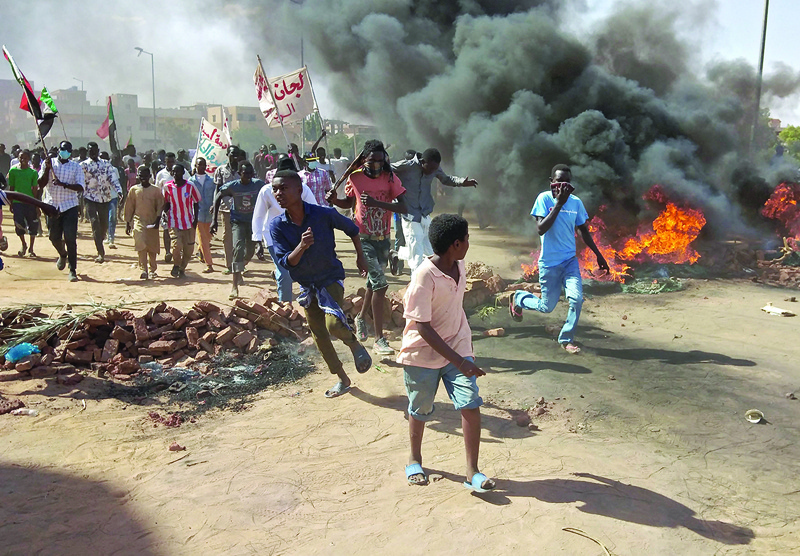 OMDOURMAN: Sudanese anti-coup protesters attend a gathering in the capital Khartoum's twin city of Omdurman yesterday, to express their support for the country's democratic transition which a military takeover and deadly crackdown derailed. - AFP
OMDOURMAN: Sudanese anti-coup protesters attend a gathering in the capital Khartoum's twin city of Omdurman yesterday, to express their support for the country's democratic transition which a military takeover and deadly crackdown derailed. - AFPKHARTOUM: Thousands of Sudanese anti-coup protesters took to the streets yesterday to support the country's democratic transition which a military takeover and deadly crackdown derailed. The protests come almost a week after the military last Monday detained Sudan's civilian leadership, dissolved the government and declared a state of emergency, leading to a chorus of international condemnation.
Earlier demonstrations against the coup were countered by a security response that has left at least nine protesters dead and wounded around 170. Despite the bloodshed, organizers yesterday aimed to stage a "million-strong" march against the military's power grab, similar to mass protests that led to the toppling of autocrat Omar Al-Bashir in 2019. Hundreds gathered in the capital Khartoum and its twin cities of Omdurman and Khartoum-North, according to witnesses and AFP correspondents.
"No, no to military rule", and "We are free revolutionaries and we will continue the road" of democratic transition, they chanted in Khartoum. Others held posters of Prime Minister Abdalla Hamdok, ousted by the military, with slogans saying, "Don't back down." In east Khartoum, protesters set car tyres on fire and held posters reading, "It's impossible to go back", while in the city's southern district banners expressed concern that the country might end up back on Washington's state sponsors of terrorism list.
That designation, accompanied by years of crippling sanctions, was lifted only last December which opened the way this year to more than $50 billion in debt relief and renewed largesse from the International Monetary Fund and World Bank. After the coup, the World Bank suspended aid to Sudan. Other protesters called for "freedom to the members of cabinet" who have been detained since the putsch. Several pro-democracy activists have also been arrested following the takeover led by General Abdel Fattah Al-Burhan, Sudan's de facto leader since the ouster of Bashir which came at the cost of more than 250 lives.
Warnings on violence
On the eve of the rallies, a US official put this week's death toll at between 20 and 30, adding the protests would be a "real test" of the intentions of Sudan's military. "We call on the security forces to refrain from any and all violence against protesters and to fully respect the citizens' right to demonstrate peacefully," the official in Washington said on condition of anonymity. A similar call came from Britain's special envoy for Sudan and South Sudan, Robert Fairweather. "The security services and their leaders will bear responsibility for any violence towards any protesters," he said on Twitter. On Friday, UN Secretary-General Antonio Guterres called on the military "to show restraint and not to create any more victims."
Phone lines were largely down by yesterday, as security forces deployed in large numbers and blocked bridges connecting the capital, Khartoum, with its sister cities. They set up random checkpoints on main roads, randomly frisking passers-by and searching cars. Before the protests began Sudan's information ministry, which backs a civilian government, warned in a statement "that the coup authority is planning to fabricate instances of destruction to justify its excessive violence".
Protesters, who during the week barricaded roads with rocks, debris and burning tyres, have in some cases been met with tear gas, rubber-coated bullets, and live rounds. Shops have largely been shuttered, and government employees have refused to work as part of a campaign of civil disobedience. Finance Minister Gibril Ibrahim, who leads an ex-rebel group aligned with the military, emphasized protesters' right to demonstrate but suggested they were the ones prone to violence.
"Destroying sidewalks, electricity poles, and damaging properties which were built by the people has nothing to do with peaceful expression," he said in a tweet. Sudan state TV showed a series of testimonies from military men alleging that protesters wounded them during clashes, as well as ordinary Sudanese hailing the army and criticizing the civil disobedience campaign. The same channel reported on Thursday that its head Luqman Ahmed, a veteran advocate of civilian rule, had been sacked.
Aid frozen
Sudan had been led since August 2019 by a civilian-military ruling council, alongside Hamdok's government, as part of the now stalled transition to full civilian rule. The transition was supposed to last three years and culminate in elections. Hamdok was briefly detained, then released and placed under effective house arrest. Burhan, a senior general under Bashir's three decades of iron-fisted rule, has insisted the military takeover "was not a coup" but only meant to "rectify the course of the Sudanese transition".
Along with World Bank, the United States also froze aid - a heavy blow to a country already mired in a dire economic crisis that began under Bashir. Monday's power grab was the latest coup in Sudan, one of the world's least developed countries which has enjoyed only rare democratic interludes since independence in 1956 and spent decades riven by civil war. - AFP










